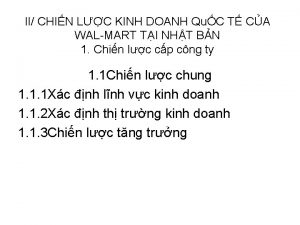Some of the different factors that can cause













- Slides: 13

• Some of the different factors that can cause extracellular and intracellular volumes to change markedly are • ingestion of water • dehydration • intravenous infusion of different types of solutions, • loss of large amounts of fluid from the gastrointestinal tract • loss of abnormal amounts of fluid by sweating or through the kidneys

1. Water moves rapidly across cell membranes therefore the osmolarities of intracellular and extracellular fluids remain almost exactly equal to each other except for a few minutes after a change in one of the compartments 2. Cell membranes are impermeable to many solutes therefore the number of osmoles in the extracellular or intracellular fluid generally remains constant unless solutes are added to or lost from the extracellular compartment

Effect of Adding Saline Solution to the Extracellular Fluid • If an isotonic saline solution is added to the extracellular fluid compartment the osmolarity of the extracellular fluid does not change therefore no osmosis occurs through the cell membranes • The only effect is an increase in extracellular fluid volume

• If a hypertonic solution is added to the extracellular fluid, the extracellular osmolarity increases and causes osmosis of water out of the cells into the extracellular compartment • The net effect is an increase in extracellular volume, decrease in intracellular volume and a rise in osmolarity in both compartments

• If a hypotonic solution is added to the extracellular fluid, the osmolarity of the extracellular fluid decreases and some of the extracellular water diffuses into the cells until the intracellular and extracellular compartments have the same osmolarity

Hyponatremia and Hypernatremia • When plasma sodium concentration is reduced more than a few milliequivalents below normal (about 142 m. Eq/L), a person is said to have hyponatremia • When plasma sodium concentration is elevated above normal, a person is said to have hypernatremia

Causes of Hyponatremia: Excess Water or Loss of Sodium • Hyponatremia-dehydration (Adrenal insufficiency, overuse of diuretics, diarrhea, vomiting • Plasma sodium ↓ • ECF volume↓ • ICF volume↑

• Hyponatremia-overhydration (Excess ADH, bronchogenic tumors) • Plasma sodium ↓ • ECF volume↑ • ICF volume↑

Consequences of Hyponatremia: Cell Swelling • Rapid changes in cell volume as a result of hyponatremia can have profound effects on tissue and organ function especially the brain • A rapid reduction in plasma sodium concentration, for example can cause brain cell edema and neurological symptoms, including headache, nausea, lethargy, and disorientation • If plasma sodium concentration rapidly falls below 115 to 120 mmol/L, brain swelling may lead to seizures, coma, permanent brain damage and death

• When hyponatremia evolves more slowly over several days the brain and other tissues respond by transporting sodium, chloride, potassium, and organic solutes, such as glutamate from the cells into the extracellular compartment • This attenuates osmotic flow of water into the cells and swelling of the tissues

Causes of Hypernatremia: Water Loss or Excess Sodium • Hypernatremia-dehydration (Diabetes insipidus, excessive sweating) • Plasma sodium ↑ • ECF volume↓ • ICF volume↓

• Hypernatremia-overhydration (Cushing's disease, primary aldosteronism) • Plasma sodium↑ • ECF volume↑ • ICF volume↓

• Consequences of Hypernatremia: Cell Shrinkage
 Searching for other roadway users includes
Searching for other roadway users includes Phân độ lown
Phân độ lown Block xoang nhĩ là gì
Block xoang nhĩ là gì Thể thơ truyền thống
Thể thơ truyền thống Thơ thất ngôn tứ tuyệt đường luật
Thơ thất ngôn tứ tuyệt đường luật Walmart thất bại ở nhật
Walmart thất bại ở nhật Tìm vết của mặt phẳng
Tìm vết của mặt phẳng Con hãy đưa tay khi thấy người vấp ngã
Con hãy đưa tay khi thấy người vấp ngã Tôn thất thuyết là ai
Tôn thất thuyết là ai Gây tê cơ vuông thắt lưng
Gây tê cơ vuông thắt lưng Sau thất bại ở hồ điển triệt
Sau thất bại ở hồ điển triệt Ter death certificate
Ter death certificate Greylag goose egg-retrieval behavior
Greylag goose egg-retrieval behavior Proximate causation vs ultimate causation
Proximate causation vs ultimate causation

























